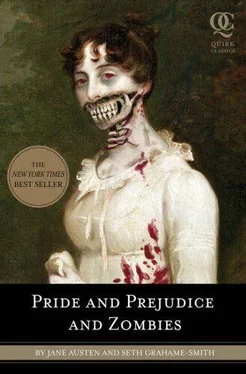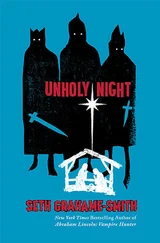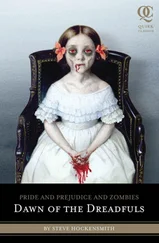
SETH GRAHAME-SMITH
PRIDE AND PREJUDICE AND ZOMBIES
“A FEW OF THE GUESTS, WHO HAD THE MISFORTUNE OF BEING TOO NEAR THE WINDOWS, WERE SEIZED AND FEASTED ON AT ONCE.”
PRIDE AND PREJUDICE AND ZOMBIES

THE CLASSIC REGENCY ROMANCE-NOW WITH ULTRAVIOLENT ZOMBIE MAYHEM
BY JANE AUSTEN AND SETH GRAHAME-SMITH
A few of the guests, who had the misfortune of being too near the windows, were seized and feasted on at once. Frontispiece
Mr. Darcy watched Elizabeth and her sisters work their way outward, beheading zombie after zombie as they went. page 15
Elizabeth lifted her skirt, disregarding modesty, and delivered a swift kick to the creature’s head. page 29
Two adult unmentionables-both of them male-busied themselves feasting upon the flesh of the household staff. page 81
The wedding took place, and no one other than Elizabeth seemed to suspect the bride’s condition. page 111
“My dear girl,” said her ladyship. “I suggest you take this contest seriously. My ninjas will show you no mercy.” page 131
One of her kicks found its mark, and Darcy was sent into the mantelpiece with such force as to shatter its edge. page 150
The rules were simple: Sneak up behind one of the large bucks grazing in the nearby woods, wrestle it to the ground, and kiss it on the nose before letting it go. page 183
The smoke from Darcy’s musket hung in the air around him, wafting Heavenward through his thick mane of chestnut hair. page 200
“Weak, silly girl! So long as there is life in this old body, you shall never again be in the company of my nephew!” page 291
The creatures were crawling on their hands and knees, biting into ripe heads of cauliflower, which they had mistaken for stray brains. page 303
IT IS A TRUTH universally acknowledged that a zombie in possession of brains must be in want of more brains. Never was this truth more plain than during the recent attacks at Netherfield Park, in which a household of eighteen was slaughtered and consumed by a horde of the living dead.
“My dear Mr. Bennet,” said his lady to him one day, “have you heard that Netherfield Park is occupied again?”
Mr. Bennet replied that he had not and went about his morning business of dagger sharpening and musket polishing-for attacks by the unmentionables had grown alarmingly frequent in recent weeks.
“But it is,” returned she.
Mr. Bennet made no answer.
“Do you not want to know who has taken it?” cried his wife impatiently.
“Woman, I am attending to my musket. Prattle on if you must, but leave me to the defense of my estate!”
This was invitation enough.
“Why, my dear, Mrs. Long says that Netherfield is taken by a young man of large fortune; that he escaped London in a chaise and four just as the strange plague broke through the Manchester line.”
“What is his name?”
“Bingley. A single man of four or five thousand a year. What a fine thing for our girls!”
“How so? Can he train them in the ways of swordsmanship and musketry?”
“How can you be so tiresome! You must know that I am thinking of his marrying one of them.”
“Marriage? In times such as these? Surely this Bingley has no such designs.”
“Designs! Nonsense, how can you talk so! It is very likely that he may fall in love with one of them, and therefore you must visit him as soon as he comes.”
“I see no occasion for that. And besides, we mustn’t busy the roads more than is absolutely necessary, lest we lose more horses and carriages to the unfortunate scourge that has so troubled our beloved Hertfordshire of late.”
“But consider your daughters!”
“I am considering them, silly woman! I would much prefer their minds be engaged in the deadly arts than clouded with dreams of marriage and fortune, as your own so clearly is! Go and see this Bingley if you must, though I warn you that none of our girls has much to recommend them; they are all silly and ignorant like their mother, the exception being Lizzy, who has something more of the killer instinct than her sisters.”
“Mr. Bennet, how can you abuse your own children in such a way? You take delight in vexing me. You have no compassion for my poor nerves.”
“You mistake me, my dear. I have a high respect for your nerves. They are my old friends. I have heard of little else these last twenty years at least.”
Mr. Bennet was so odd a mixture of quick parts, sarcastic humour, reserve, and self-discipline, that the experience of three-and-twenty years had been insufficient to make his wife understand his character. Her mind was less difficult to develop. She was a woman of mean understanding, little information, and uncertain temper. When she was discontented, she fancied herself nervous. And when she was nervous-as she was nearly all the time since the first outbreak of the strange plague in her youth-she sought solace in the comfort of the traditions which now seemed mere trifles to others.
The business of Mr. Bennett’s life was to keep his daughters alive. The business of Mrs. Bennett’s was to get them married.
MR. BENNET WAS AMONG the earliest of those who waited on Mr. Bingley. He had always intended to visit him, though to the last always assuring his wife that he should not go; and till the evening after the visit was paid she had no knowledge of it. It was then disclosed in the following manner. Observing his second daughter employed in carving the Bennett crest in the handle of a new sword, he suddenly addressed her with:
“I hope Mr. Bingley will like it, Lizzy.”
“We are not in a way to know what Mr. Bingley likes,” said her mother resentfully, “since we are not to visit.”
“But you forget, mamma,” said Elizabeth, “that we shall meet him at the next ball.”
Mrs. Bennet deigned not to make any reply, but, unable to contain herself, began scolding one of her daughters.
“Don’t keep coughing so, Kitty, for Heaven’s sake! You sound as if you have been stricken!”
“Mother! What a dreadful thing to say, with so many zombies about!” replied Kitty fretfully. “When is your next ball to be, Lizzy?”
“To-morrow fortnight.”
“Aye, so it is,” cried her mother, “and it will be impossible to introduce him, since we shall not know him ourselves. Oh, how I wish I had never heard the name Bingley!”
“I am sorry to hear that ,” said Mr. Bennett. “If I had known as much this morning I certainly would not have called on him. It is very unlucky; but as I have actually paid the visit, we cannot escape the acquaintance now.”
The astonishment of the ladies was just what he wished; that of Mrs. Bennet perhaps surpassing the rest; though, when the first tumult of joy was over, she began to declare that it was what she had expected all the while.
“How good it was in you, my dear Mr. Bennet! But I knew I should persuade you at last. I was sure you loved your girls too well to neglect such an acquaintance. Well, how pleased I am! And it is such a good joke, too, that you should have gone this morning and never said a word about it till now.”
Читать дальше














